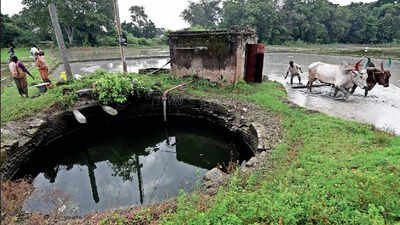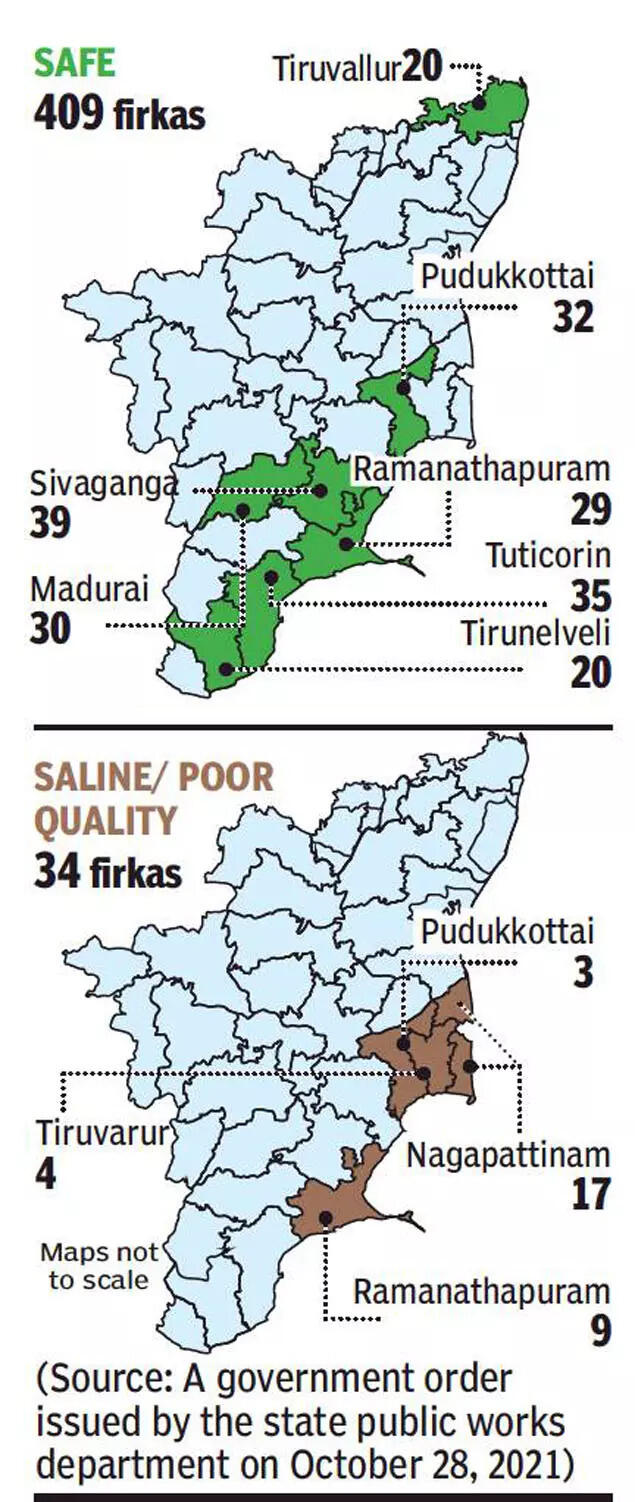Top Searches
- News
- City News
- chennai News
- Recharging groundwater only way to slake Tamil Nadu’s thirst
Recharging groundwater only way to slake Tamil Nadu’s thirst
Recharging groundwater only way to slake Tamil Nadu’s thirst

Water experts say TN is the third worst state in terms of groundwater exploitation after Punjab and Haryana
CHENNAI: Monsoon is here. Rain has led to flooding and yet Tamil Nadu is almost always short of water. More so because of the absence of a groundwater policy.
The ground and surface water resources wing of the public works department, in a study conducted last year, an order for which was passed last week, found groundwater is overexploited (with more than 100% extraction) in 435 revenue firkas (sub-divisions within taluks) in the state.

At least 26 firkas in Chennai district are over-exploited, including all those in Egmore-Nungambakkam, Fort-Tondiarpet, Mambalam-Guindy, Mylapore-Triplicane, Purasawalkam-Perambur, Ambattur, Maduravoyal and Tiruvottiyur regions. Only Alandur, Sholinganallur, and Pallikaranai are safe.
Thanjavur, the core delta region, and Salem top the districts that are over-exploited. The only solace is that the number of over-exploited and critical firkas have reduced from 462 and 79 respectively in 2017. The study shows 99 firkas have improved since the last assessment. Sustained efforts such as strengthening bunds and recharge wells, restoration of water bodies and check dams by government agencies in recent years may have helped, but the state’s condition is precarious.

Water experts say TN is the third worst state in terms of groundwater exploitation after Punjab and Haryana. “First the state has to harvest rainwater and use it judiciously. Most of our basins are ‘closed’, meaning demand cannot be met anymore. Demand keeps growing with increased population and urbanisation, while the amount of rainfall remains the same. Climate change has led to intense rainfall in a shorter period,” said B V Mudgal, Anna University Centre for Water Resources director, calling for measures to store as much rainwater as possible.
In terms of groundwater table, Tirupur, Namakkal, Tuticorin and Dharmapuri districts have recorded a sharp decline.
Owing to poor availability of ground water, providing household tap water connection in rural areas is a pipedream. Municipal administration and water supply minister K N Nehru and minister for rural development K R Periakaruppan met Union Jal Shakti minister Gajendra Singh Shekhawat recently, seeking funds for drinking water projects. Rapid urbanisation has been taking a toll on the state, which is heavily dependent on its neighbours states to meet its irrigation and drinking water needs.
“People want to dispose of the runoff as quickly as possible. The government has sought to address this by encouraging rooftop rainwater harvesting. But we need to go beyond that and look at Sustainable Urban Drainage System (SUDS). SUDS has a focused approach to intercept rainfall and runoff at multiple levels. It gives sufficient opportunity and time for possible infiltration and recharge.
“Recharge shafts embedded within storm water drains is a welcome idea in the newly laid out integrated storm water drains in Chennai. However, the scale of adaptation of SUDS in storm water drains has to start from the planning stage for improvement in groundwater level, quality and to reduce floods. Building regulations should be enforced to ensure there is undeveloped areas in every project to facilitate infiltration of water into the ground,” Balaji Narasimhan professor at IIT Madras Environmental and Water Resources Engineering. Narasimhan was associated with the development of water resources information system in the Union Jal Shakti ministry.
At present, Chennai Metropolitan Area Ground Water (Regulation) Act regulates groundwater extraction in Chennai and 304 villages in Kancheepuram and Tiruvallur. “The government is working on a draft groundwater bill, which will soon be introduced in the assembly. There is no mechanism to check extraction for irrigation, which accounts for 70% of the total extraction. There is a plan to put a cap on the power of motors used for irrigation or restrict the hours of extraction,” said a senior government official.
The new law is likely to form a water regulatory authority with statutory powers, headed by the chief secretary and comprising representatives of government agencies like TWAD Board and Metrowater. It will impose penalties for violations and lay down restrictions on the use of groundwater.
The ground and surface water resources wing of the public works department, in a study conducted last year, an order for which was passed last week, found groundwater is overexploited (with more than 100% extraction) in 435 revenue firkas (sub-divisions within taluks) in the state.

At least 26 firkas in Chennai district are over-exploited, including all those in Egmore-Nungambakkam, Fort-Tondiarpet, Mambalam-Guindy, Mylapore-Triplicane, Purasawalkam-Perambur, Ambattur, Maduravoyal and Tiruvottiyur regions. Only Alandur, Sholinganallur, and Pallikaranai are safe.
Thanjavur, the core delta region, and Salem top the districts that are over-exploited. The only solace is that the number of over-exploited and critical firkas have reduced from 462 and 79 respectively in 2017. The study shows 99 firkas have improved since the last assessment. Sustained efforts such as strengthening bunds and recharge wells, restoration of water bodies and check dams by government agencies in recent years may have helped, but the state’s condition is precarious.

Water experts say TN is the third worst state in terms of groundwater exploitation after Punjab and Haryana. “First the state has to harvest rainwater and use it judiciously. Most of our basins are ‘closed’, meaning demand cannot be met anymore. Demand keeps growing with increased population and urbanisation, while the amount of rainfall remains the same. Climate change has led to intense rainfall in a shorter period,” said B V Mudgal, Anna University Centre for Water Resources director, calling for measures to store as much rainwater as possible.
In terms of groundwater table, Tirupur, Namakkal, Tuticorin and Dharmapuri districts have recorded a sharp decline.
Owing to poor availability of ground water, providing household tap water connection in rural areas is a pipedream. Municipal administration and water supply minister K N Nehru and minister for rural development K R Periakaruppan met Union Jal Shakti minister Gajendra Singh Shekhawat recently, seeking funds for drinking water projects. Rapid urbanisation has been taking a toll on the state, which is heavily dependent on its neighbours states to meet its irrigation and drinking water needs.
“People want to dispose of the runoff as quickly as possible. The government has sought to address this by encouraging rooftop rainwater harvesting. But we need to go beyond that and look at Sustainable Urban Drainage System (SUDS). SUDS has a focused approach to intercept rainfall and runoff at multiple levels. It gives sufficient opportunity and time for possible infiltration and recharge.
“Recharge shafts embedded within storm water drains is a welcome idea in the newly laid out integrated storm water drains in Chennai. However, the scale of adaptation of SUDS in storm water drains has to start from the planning stage for improvement in groundwater level, quality and to reduce floods. Building regulations should be enforced to ensure there is undeveloped areas in every project to facilitate infiltration of water into the ground,” Balaji Narasimhan professor at IIT Madras Environmental and Water Resources Engineering. Narasimhan was associated with the development of water resources information system in the Union Jal Shakti ministry.
At present, Chennai Metropolitan Area Ground Water (Regulation) Act regulates groundwater extraction in Chennai and 304 villages in Kancheepuram and Tiruvallur. “The government is working on a draft groundwater bill, which will soon be introduced in the assembly. There is no mechanism to check extraction for irrigation, which accounts for 70% of the total extraction. There is a plan to put a cap on the power of motors used for irrigation or restrict the hours of extraction,” said a senior government official.
The new law is likely to form a water regulatory authority with statutory powers, headed by the chief secretary and comprising representatives of government agencies like TWAD Board and Metrowater. It will impose penalties for violations and lay down restrictions on the use of groundwater.
FacebookTwitterLinkedinEMail
Start a Conversation
end of article

